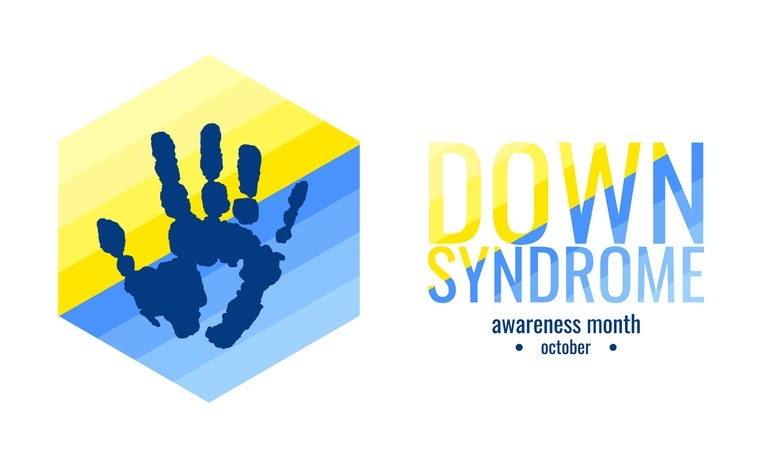October is Down Syndrome Awareness Month

Having a child with Special Needs presents challenges. What many people don’t realize is that each Special Needs child is so unique in their needs. Everything you do and arrange for them needs to be tailored exactly to them, which carries on through their teen and adult years.
Included in that list is Dental Care.
If you have a child with Down’s Syndrome, there are certain dental issues you need to be aware of to address.
Down Syndrome children have what is referred to as Delayed Eruption for both baby teeth and permanent teeth. They may come in late compared to children without Down Syndrome. On average, babies with Down Syndrome get their first teeth at 12-24 months, compare to those without Down Syndrome who typically get their first teeth between 6-12 months. Down Syndrome children may not get all 20 baby teeth until 4-5 years of age compare to 2-3 years of age. Teeth may also erupt in a different order than expected.
Teeth may be smaller than average with a shorter root and frequently people with Down Syndrome have missing teeth. The smaller teeth change the spacing between the teeth. There is a tendency of smaller jaws which can cause crowding or impacting of teeth as well as an awkward bite as the teeth do not properly line up. Orthodontics can improve this issue, but this presents different problems with dental hygiene and speech.
People with Down Syndrome may have a difference in proportion of tongue to mouth. Typically, large tongues with or without a small upper jaw makes their tongue too large for their mouth. It is also common for them to have grooves and fissures on their tongues which require special attention.
Developmental issues of the mouth are carried with the patient throughout their lives so special attention does not end with childhood.
From childhood through the adult years, people with Down Syndrome have an impaired immune system and are lacking some of the natural protections against the disease that people without Down Syndrome have. Special attention is needed to prevent gum disease. Routine brushing twice daily, flossing daily and regular visits to the dentist who understands their needs is a big plus. Bone levels need to be monitored and gums checked for signs of dental and periodontal disease. It is essential to see a dentist every six months to stay ahead of this.
Down Syndrome people do get cavities like everyone else, so brushing with fluoride toothpaste, careful flossing, and limiting the quantity and frequency of sweets will help to prevent the development of cavities.
Essentially, you need to find a dentist that is adept at treating patients with a variety of special needs that can work with your Down Syndrome loved one and put them (and you) at ease.
A significant part of our practice involves treating patients with special needs, whether it be Asperger’s Syndrome, Fragile X Syndrome, Alzheimer’s, Down Syndrome, Parkinson’s Disease, or just people who are extremely anxious and phobic. We are adept at treating those with numerous medical background concerns and issues (cancer patients, individuals with mental and physical challenges, post cardiac surgery valve replacement patients needing IV antibiotics, stroke patients, seizure disorders and neurologically impaired patients).
Give us a call, come on in for a consultation and learn how you can lay back and enjoy a visit to the dentist, as both a patient and a care giver. Dr. Lee Lichtenstein and his highly trained staff offer general dentistry services as well as dental treatments that can be performed using sedation dentistry and general anesthesia techniques to make patients’ experiences more pleasant and comfortable.
723 North Beers Street
Holmdel, NJ 07733.
(732) 739-3337
email us at leemlichtenstein@gmail.com
